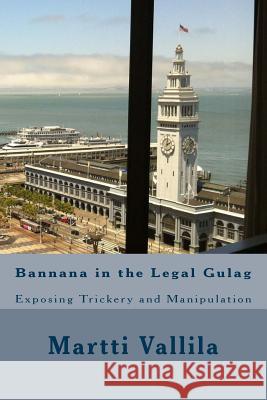Bannana in the Legal Gulag: Exposing Trickery and Manipulation » książka
Bannana in the Legal Gulag: Exposing Trickery and Manipulation
ISBN-13: 9781490340548 / Angielski / Miękka / 2013 / 356 str.
The book describes my experiences in the legal processes of Silicon Valley and Finland, initiated by good faith efforts to commercialize potentially "transformational technologies" from Russian inventors. In each of the two cases described the Russian inventor's non-compliance with obligations stipulated in signed agreements forced the initiation of arbitrations where I found myself opposed by top notch legal talent, sometimes forced into representing myself. In the Silicon Valley case the scientist was Dr. Vladimir Poponin, his technology: the direct optical detection of DNA (promising the rapid reading of the human genome, the gateway to personalized medicine), my opponent: billionaire Vinod Khosla, who wished to remain anonymous. In Finland the scientist was Dr. Igor Pomytkin, his technology: a treatment and prevention of Alzheimer's and many age related neurological ailments, my adversary: top law firm Juridia, representing the other side, and my own lawyer I discuss parallels between the two experiences. The first exposed hard ball legal tactics employed by Fenwick & West, in the service of a high profile Silicon Valley investor (Vinod Khosla) whose "behind the scene" deeds were in conflict with his carefully crafted public persona. The appendix of the book includes extensive excerpts from the transcript of the five day arbitration hearing, providing the reader an "inside look" at the process, and a perspective from which to judge the truthfulness of representations I make in my text. My California experience provided important lessons when I was confronted, years later, with behavior in Finland which forced me to initiate legal action against my co-founders of Buddha Biopharma Oy. In each case procedural efforts were initiated to terminate the arbitration, in favorable court venues, without regard to the underlying "facts" of the case. Efforts at the "discovery" of evidence were stymied in each arbitration by delay and obfuscation. In the California arbitration no final "award" was announced, for reasons described in the book, leaving the hearing transcript as the only evidence from the proceeding. A Court decision supporting my position was issued (and is included in the appendix). In the Finnish case an "award" emerged and is included in the appendix, with commentary. With this combination the reader is provided with a look inside the arbitration "process." Lawyers are exposed as word splitters, their strategies of attempting to have cases thrown out on procedural grounds are detailed. The behavior of the arbitrators can be viewed as driven by their "economic interests," and protective of the interests of powerful patrons. There is a David vs. Goliath element to both tales. I initiated commercialization efforts on behalf of Russian inventors in good faith, not imagining the legal gulag into which I would wander. I have a right, and feel a responsibility, to tell this story in the hope that readers will learn useful lessons on how to negotiate with potential Russian business partners, steps to take in commercializing their technologies, what to do, what to watch out for, what not to do in interactions with investors and lawyers. The resolution of each case awaits further developments. The market will ultimately render a verdict with respect to the potential of the technologies. The book provides the reader with material from which to draw conclusions about the process an enterpreneur faces when attempting to launch a disruptive idea into the gulag of vested interests.
Zawartość książki może nie spełniać oczekiwań – reklamacje nie obejmują treści, która mogła nie być redakcyjnie ani merytorycznie opracowana.











